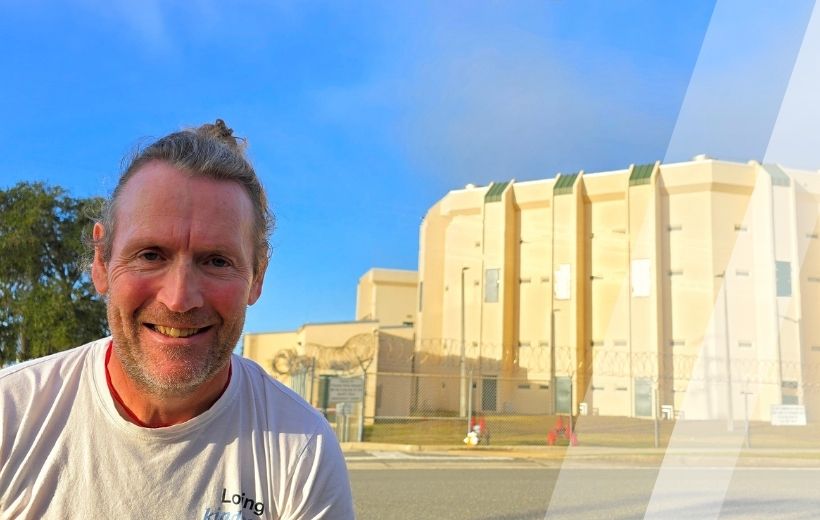Meditation in Prison: Finding Freedom
By Franka Cordua-von Specht • 3 min read

YEARS AGO, MARK O’DONAGHUE CONTEMPLATED teaching meditation in prisons. He was inspired by Fleet Maull, a leading figure in prison dharma work who also happened to be part of Mark’s meditation community in Boulder, Colorado. The idea of bringing meditation to incarcerated individuals resonated, but for years, he doubted himself. “I didn’t have the confidence that I had something to offer that was authentically me,” Mark, 55, shared from his home that he shares with his wife, Michele, in St. Augustine, Florida. The doubt, together with a general fear of public speaking, prevented him from diving more deeply into teaching.
But that changed when Mark immersed himself in Mingyur Rinpoche’s teachings. In particular, it was the view that we are all endowed with perfect, inherent basic goodness — that turned his world upside down. “That was the first time I realized that I wasn’t broken,” he shared. “Hey, I’m not broken!” It was an astonishing new way to view himself — and others. This was a message he could get behind to share.
When the first year of the Tergar Meditation Teacher Program (MTP) was announced in 2023, Mark knew he wanted to participate. It was a big commitment and therefore not an easy decision, but he hasn’t looked back. “It was the best year I ever had.”
He praised the program’s structure and mentorship. “I learned so much, not just about teaching but about truly connecting with people.” He spoke about how the program pushed him out of his comfort zone, forcing him to refine his teaching skills and ultimately build his confidence. “None of it felt comfortable at first, but now I feel so much more at ease teaching.”
Mark’s prison meditation work took shape during the Meditation Teacher Program. In the program’s enterprise module, he was encouraged to put his learning into action, so he picked up the phone and called the local county prison. That single call set in motion a process that would take time — fingerprints, background checks, and persistence. He called the sheriff’s office monthly, politely checking in, asking questions, and indicating his interest.
His request to introduce meditation was unprecedented in St. Johns County. The sheriff’s deputy overseeing volunteers had to take Mark’s proposal all the way to the top: the sheriff. To support his case, Mark compiled research on the benefits of meditation, gathering scientific studies. And then, in a moment of unexpected momentum, the deputy called: “Do you want to go in tonight?” A few days later, Mark stepped through the prison’s doors.
The view that we are all endowed with perfect, inherent basic goodness — that turned his world upside down. “That was the first time I realized that I wasn’t broken,” he shared. It was an astonishing new way to view himself — and others.
Since that first visit, Mark has been returning to the prison weekly. Every Friday at 7:30 p.m., he sits with a group of incarcerated men, offering them meditation sessions based on the teachings of Mingyur Rinpoche.
One night, he felt tension in the prison halls. The guards were on edge, the inmates were agitated, and a verbal conflict erupted. A man was removed. Others banged on the door, demanding respect. Mark sat quietly at the front of the room of meditators, at ease, waiting. A particularly agitated inmate turned his energy toward Mark, but he didn’t react. He simply held space, listened, and responded. “Imagine if I could show you a path to freedom that does not rely on your external circumstances.”
The thirteen men listened closely. “You are not fundamentally flawed,” Mark shared. “You are whole, complete, and perfect just as you are. You just don’t recognize it yet.”
By the end of the session, the group was deeply moved. ‘We didn’t want that to end,’ they told him. A number of them shook his hand in thanks. ‘I have a completely different idea of what meditation is about now,’ he heard.
The men in Mark’s sessions come from diverse backgrounds, and many had never encountered meditation before. His empathy for marginalized communities comes from his early years. Growing up in poverty in Ireland, he remembers stealing potatoes from a farmer’s field at age seven to feed his siblings. He describes his childhood as “feral,” learning to survive in an unstable home where parental care was inconsistent.
But the Irish culture also instilled in him a sense of communal care. “We’ve always come to the defense of the vulnerable,” he says. “Amnesty International was founded in Ireland. It’s in our nature to look at those who don’t have a voice and want to give them one.”
That perspective carries into his prison work. He sees the inmates’ innate well-being — their capacity for goodness, connection, and transformation. No one is broken.
May 2025

Franka Cordua-von Specht, co-founder of the Tergar Vancouver Practice Group and Tergar Canada, works for Tergar International’s marketing and communication team. She is a Tergar Guide and facilitates Joy of Living workshops.
Learn meditation under the skillful guidance of world-renowned teacher Yongey Mingyur Rinpoche at your own pace.


It’s difficult for us to ascertain how our meditation practice is progressing but if we look outside of ourselves to how we relate to the world around us we will get some clues.

“The invitation from Rinpoche, which can be found in the Joy of Living teachings, is this: can we learn to stay with the pull of craving in a way that’s balanced, open, and spacious.” – Stephanie Wagner

“The approach and flying into Kathmandu along the edge of the Himalayas is spectacular,” Hughes said. This, along with Boudhanath, a Tibetan enclave in Kathmandu, are among his highlights.
If you enjoyed reading our articles, please join our mailing list and we’ll send you our news and latest pieces.